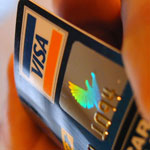My Financial Implosion: Keeping the Plastic Paid Off
 ‘œToday, there are three kinds of people: the haves, the have-nots, and the have-not-paid-for-what-they-haves.’ ‘“ Earl Wilson
‘œToday, there are three kinds of people: the haves, the have-nots, and the have-not-paid-for-what-they-haves.’ ‘“ Earl Wilson
In a world where credit card issuers can suddenly give you unfavorable terms, or even cancel your card outright, I’ve long since recognized the wisdom in keeping my credit cards paid off every month. I feel pretty dumb when I’ve had to pay interest charges, late penalties or over-limit fees, because I know that I haven’t received any added value, and I’ve increased the cost of goods and services purchased.
Although paying the cards off every month is the goal around our house, I’ve also realized that adhering to that goal is tougher than it seems. Sliding a piece of plastic through a slot is a much more convenient way of paying than writing a check or carrying around a wad of cash. Unfortunately, it’s also much more insidious. It’s easy to get to the end of the month not realizing how much my wife and I have spent.
We’ve tried a number of methods to keep the cards paid off, but not all have worked as well as we’d like. So far, we’ve tried:
- Abandoning the credit cards in favor of cash. Although not using the cards is certainly an effective way of keeping them paid off, we’ve found that it’s markedly inconvenient. Cash is hard to track, and often gets spent without being recorded, so we find ourselves unable to explain where all the money went by the end of the month.
- Using the checkbook. Although this method is more convenient than cash, we’ve found it’s not completely satisfactory, either. At least half the time, the checkbook seems not to be with the person who needs it. We’ve also learned that a number of local merchants won’t accept checks, and those that do tend to roll their eyes when you whip out the checkbook and there’s a long line at the cash register. Finally, we’ve discovered that my wife is notoriously bad at remembering to record her payments in the check register, so we’ve come precariously close to bouncing checks a couple of times.
- Pretending the credit cards are checks. We’ve experimented with recording each credit card transaction in the checkbook register as if it were a check, which guarantees the money is available at the end of the month. This has worked less well for us, because it makes reconciling messy, and my wife often forgets to record transactions.
- Using a debit card. Although I think this is very workable for couples who are good at recording their transactions, for our family it is a little dangerous. It’s just too easy to overspend, and both our bank and credit union will honor debit card charges, even if the funds aren’t available in the account. Although we haven’t earned ourselves any overdraft fees, I view it as an accident waiting to happen.
- Paying the credit card company for every charge. Although this method worked pretty well in keeping us out of trouble with late, over-limit and interest charges, I realized I was basically giving the credit card company the use of my money before it was necessary. I was giving away the tiny bit of interest I could have earned by keeping the money in my account, and it bothered me. Although there’s a certain peace of mind to paying the bills off early, there’s a trade off as well.
After what has seemed like a long series of financial experiments, I’ve finally come to a three-step solution that seems to work better for us.
- I record all credit card transactions (from paper receipts and electronic downloads) in our financial management software on a daily basis.
- Once I’ve recorded all the transactions, I make an electronic transfer from our regular checking account to an interest-bearing account in the amount of that day’s credit card charges.
- On a weekly basis I set up an online payment from our interest-bearing checking account to pay off that week’s charges. I set it to automatically pay the bill ten days before the credit card’s due date, so I no longer have to worry about whether or not the bill was paid on time. If the credit card company pulls a sneaky one and changes the payment deadline, I just re-edit the transactions and change the date.
Although my solution puts the onus of record-keeping on me, it goes a long way to give me peace of mind knowing that we’ll be able to pay our credit cards in full every month and that I won’t inadvertently miss a payment deadline.
Next in series: Prioritizing During a Financial Crisis
Photo credit: stock.xchng


Alex: As I started to read this post, I thought why don’t they just use their debit card and then I got to your list and saw why that approach is still problematic.
I’d admire your tenacious record-keeping and system you’ve put in place. Congrats on the peace of mind.
Alex, I always enjoy reading your posts. I think that you’ve found a system that works for you, so kudos to that. I don’t know that I could stand the tediousness of doing the record keeping ever single day, but it’s really the only way to know that you’re doing it right.